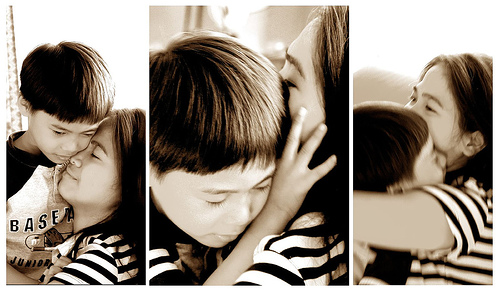
If you didn’t answer Yes to at least one of these questions, you’re probably not a parent.
We all have hard times when we know we’re messing up but just can’t seem to stop ourselves before we open our mouths. The bad news is, parenting is the toughest thing we do, and the hardest part of all is regulating ourselves. We’re only human, and that means there’s no way for us to be perfect.
But there’s good news, too. Our kids don’t need us to be perfect. In fact, it’s a good thing you’re not perfect! If you were, imagine what you’d be modeling for your child – an unattainable standard. Your poor child would feel like she could never measure up.
Your child knows she's not perfect, so your imperfection gives her hope that she might actually be okay, just the way she is. What kids need from us is the space to be imperfect, to be loved and accepted for who they are. That’s the only place any of us can start from to grow.
Maybe worse, if you were a perfect parent, your child wouldn’t learn that all human relationships experience strains and small tears, but we can repair them and make them stronger. Our children learn this beginning in infancy, when we inevitably fail, at times, to attune to them.
Let’s say we’ve been having a lovely time playing with our baby. We shake the rattle and he laughs uproariously. But after a while, his excitement overwhelms him. He feels himself spinning out of control, frightened. He needs to calm himself, to return to a lower level of arousal. He looks away.
Some parents would notice right away and realize their baby needs a break. But maybe, at least this time, not us. We’re having such a good time. It’s so exciting to see our little one so happy! And maybe there’s more; maybe we’re not feeling so great about our parenting right now because soothing the baby can be challenging, but look, we can make him laugh, and laugh more…So we miss his cue. He continues to look away, even though we get in his face and shake the rattle more insistently. He’s overwhelmed. His face crumples. He begins to cry.
So we misattuned. Our intrusiveness actually drove our baby to tears!
Is he damaged for life? Luckily, no. We can make a repair.
We take a deep breath and shift gears, from excitement to soothing. We pick our little guy up and begin to speak soothingly. He continues to cry, but less loudly, and his breathing slows. He’s calming down. He’s learned that the universe isn’t perfect and sometimes he has to raise his voice to be heard, but he has the power to repair a rift in your relationship. Because you responded quickly to his distress—which has been shown to be the most important attunement factor in how infants adjust—he’s learned that it’s a safe universe and he can count on you to respond when he needs you.
Your little one has just learned an essential lesson about relationships and trust!
Quick parental repair after a rupture in empathy is part of how children build resilience, the confidence to express their needs, the faith that they can work things out with another person. In fact, every time we misattune, our little one gets a small chance to practice regulating himself without our help. Sometimes he won’t be able to, but often he will, and with practice he’ll learn how— just like taking those first steps. So while you don’t want to intentionally create difficult experiences for your child—life will supply plenty without your assistance—your misattunements really are learning opportunities, as long as they’re followed by reconnection and outweighed by positive moments.
Is this also true for older children? Yes! When we respond to our child’s anger by yelling, we’re misattuned. If we were attuned to our child’s upset, we’d realize that her anger is a red flag that she needs help with some deeper tears and fears, and we wouldn’t take her anger personally – so we wouldn’t yell. We'd empathize, softening our heart so that she would soften hers.
But sometimes, we get triggered. We forget to see things from our child's perspective. We lose it. Later, we're filled with remorse.
Luckily, we can model how to repair a relationship rupture. “I’m so sorry I yelled at you, Sweetie…You don’t ever deserve to be yelled at….Let’s try a Do-Over….Here’s what I meant to say.” As long as our parenting blunders are followed by reconnection and outweighed by positive moments, they’re learning opportunities for our children.
What if we don’t catch ourselves quickly? It’s never too late to apologize. When we step up and do the hard emotional work to let go of being right, to open our hearts, we teach our children how to do that, too.
Just think. If you never apologized, your child would never learn how to apologize, either.
Aren’t you glad you aren’t perfect?





